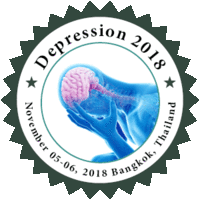
N. Nkengurutse
Psychiatric Clinic, Republic of Burundi
Title: Mental Health, recovery and resilience in Burundi: What happens in under-served communities
Biography
Biography: N. Nkengurutse
Abstract
Background and purpose: The resilience approach is in keeping with the World Health Organization's conceptualization of mental health as a positive state of psychological well-being going beyond the absence of disease (World Health Organization, 2005).
Accumulating evidence indicates the beneficial effects of a psychosocial support on general well-being in patients with mental health impairments. Less evidence is available on benefits of social-economic reinsertion in mental health resilience. This study examined the association between social rehabilitation and recovery status for one year in persons with mental illness.
Methods: A longitudinal study using information from mental health database within Psychiatric clinic included 120 inpatients aged between 15-55 in 2017. We Collected data during stay and approximately 1 year after they were discharged.
WHODAS tool was used to gather information.
Results: The mean age of sample was 22.4. Patients were women(61.5%), men(48.5%); married (43%); rural (89, 4%), under-educated (75%); refugees (93%); from large families(74%); without land (83%), job (87%) or access to health system (47%).They used traditional (92%) or faith care (35%). Screening was made by family (50%), neighbors (35%), community workers (10%) or care providers (5%).
GP diagnosed 100% of people: with Depression (57%), Psychotic features (20%), Bipolar disorders (13%), Schizophrenia (8 %). 65 % was trauma patients. Average length of stay was 20.1 days.
After one year: Home visits (12%), Psychological support (25%), medical treatment (14%) was provided. Stigmatization (60%) and poor economic reinsertion (90%) undermined improvement. Full recovery (30%) and relapse (42%) of patients were noticed 12 months later.
Conclusion and implications: This study shows how people struggle to recover from a mental illness despite challenge of access to medical services and poor social reinsertion which jeopardizes resilience.

